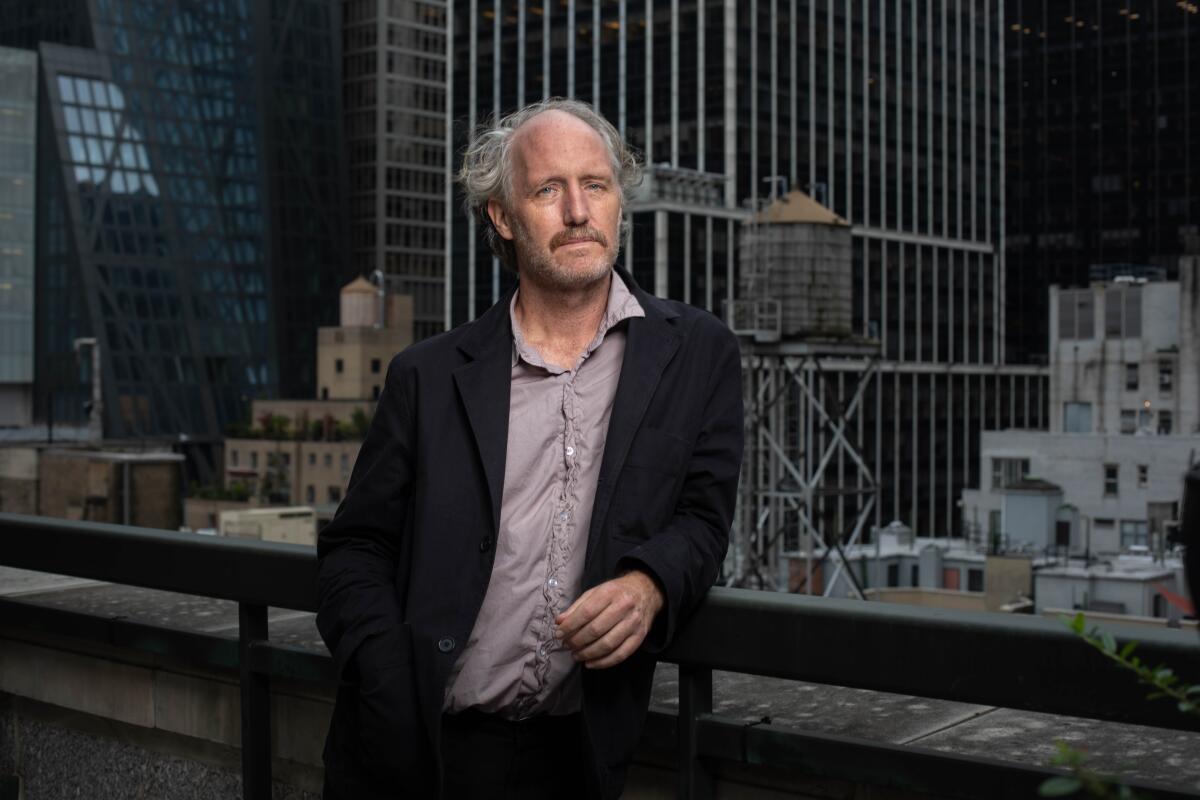Mike Mills as a director of blockbusters? No thanks. He’ll stick with intimate dramas

Mike Mills is not a prolific filmmaker. In the last 16 years, he’s directed (and written) just four scripted features: “Thumbsucker” (2005); “Beginners” (2010); 2016’s “20th Century Women” (which earned him an Oscar nomination for original screenplay); and now “C’mon C’mon,” a film about a radio journalist named Johnny (Joaquin Phoenix) who bonds with his precocious nephew Jesse (Woody Norman) while caring for him.
But taken in toto, this charmingly rumpled director-writer with a three-day beard sitting on a divan in a New York hotel room is a Renaissance man, having directed dozens of music videos and ads and designed further dozens of album covers, usually for independent artists. Of which he is one: The L.A.-based Mills and his movies hark to the golden years of Gotham’s indie scene in a way that’s simultaneously nostalgic and like a fresh, clarion call.
Mills sat down to tea with The Envelope to talk “C’mon,” weaving autobiography into his work and having zero interest in directing the next superhero blockbuster (not that anyone’s asking).
What was the seed for “C’mon C’mon,” your first film in five years?
Just being with my kid [Hopper, 9], and all the things that having a kid shows you about the world. I found it hallucinogenically, wildly intimate — the space of snuggling with someone, muttering things to each other. Because then in that intimate space are the biggest social issues, power, the future. I love when stories get like that. My dad taught me that with his coming out.
So is the relationship of Johnny and Jesse like you and Hopper?
Completely not. I’m not Joaquin at all, and Woody is not Hopper. Those two found their own way in, and in the end, I’m not just watching Johnny and Jesse, I’m watching Woody and Joaquin’s relationship, which had a real intimacy about it, because we shot in order. By the time we were in New Orleans, I didn’t have to tell Woody to put his head on Joaquin or hold his hand through a scene — they gravitated toward each other.
The film is about a lot of things — listening and communicating; Jesse literally walks around with a microphone, recording. Was that intentional?
I love that. That’s a lot of what being an adult is around kids — it’s a world of being available for what’s actually happening to this person in an authentic way, without a bunch of wishy-washy preconceptions about children being cute and innocent like in a fairy-tale land. I’d like to do a whole other movie about recording. You can’t take a still shot of sound, so sound is like time, and then time is like everything.
This is only your fourth film in 16 years. How do you pay the bills?
A mixed blessing about my career is I don’t. I never make a movie for money, and my movies are pretty cheap. I would pay myself less if I could, because I want to put it in the movie. So movies are how I lose money. I do a few ads a year, which throw me into all sorts of weird situations — I had a helicopter shot on the Great Wall of China. I shot like 500 people in Rome running down the street. You get thrown into really weird situations, so your dexterity is great.
So what would you do if someone — as “The Simpsons” might put it — backed a truck full of money up to your house and said, “Make us the next blockbuster superhero film”?
That’s not interesting to me. Making movies takes you out of your life, and I like my life too much — I love being a dad too much. And let’s be honest, no one’s ever going to do that, and I wouldn’t be very good at it.
“Beginners” was based on your father’s coming out, and “20th Century Women” was about the women in your life, like your mother. Since your parents have both passed on, what do you think they’d make of the movies you create?
Funny how no one has asked that. “Beginners” was scary on a lot of levels — I was a straight privileged dude handling my dad’s gay story of mystery, pain and happiness. Then my mom — she was born in 1925, wasn’t gender conforming, maybe a trans person, a person who did not fit into the box provided to her at the time. So I’m a visitor at best. My rule is like, “If I see them in heaven later, I have to face them.” I just have to be able to face them and say, “I did that.”
More to Read
From the Oscars to the Emmys.
Get the Envelope newsletter for exclusive awards season coverage, behind-the-scenes stories from the Envelope podcast and columnist Glenn Whipp’s must-read analysis.
You may occasionally receive promotional content from the Los Angeles Times.







